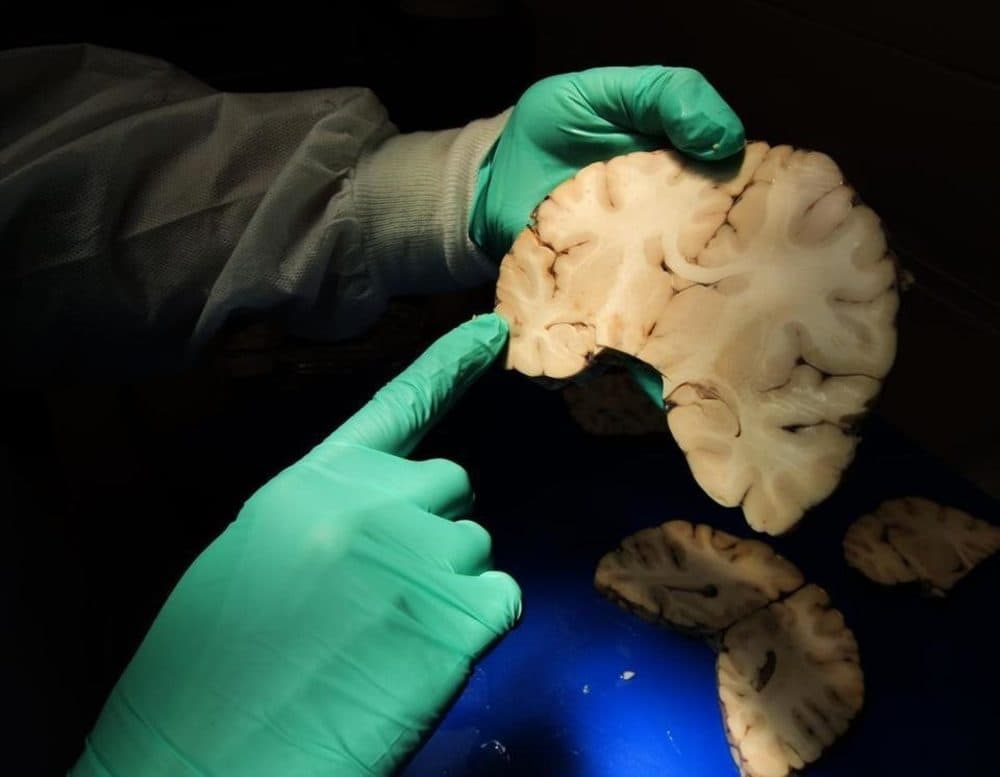Advertisement
CTE And The NFL, Plus Former Voice Of The Bruins Dave Goucher
Resume
In today's episode of Season Ticket, host Chris Gasper (@cgasper) welcomes sports investigative reporter Bob Hohler to discuss CTE in the NFL. Then, Dave Goucher, former radio voice of the Boston Bruins, calls in to talk about his new gig with the Vegas Golden Knights expansion team, his undying affection for Boston, and what it will be like calling his first game against the Bruins at the Garden on November 2nd.
Guests
- Bob Hohler (@Bob_Hohler), Sports Investigative and Enterprise Reporter, The Boston Globe
- Dave Goucher (@DavidCGoucher), TV Announcer, Vegas Golden Knights
Interview Highlights
On the history of CTE
Bob Hohler: This actually goes way back to boxing. The initial diagnosis of this was called Dementia Pugilistica. We've seen it in so many boxers over the years. Muhammad Ali is probably the best example. You keep getting hits to the head there's gonna be damage. What they've found now is it's not just concussions that are causing this. It's the repetitive sub-concussive hits—these small hits that you continue to get on and on from the time you begin playing as a child, football or any other sport, all through your career.
"Who would let a kid play knowing that that ... could happen?"
Bob Hohler
On the CTE cases that don't get as much of a public spotlight
Bob Hohler: We've seen the really high profile cases—the Junior Seau case, the Aaron Hernandez case—but we don't know about all these other guys, these forgotten guys, and what these families are going through across the country. A lot of these guys didn't make a lot of money. A lot of them are scraping by. They're struggling to get the health care they need and the families aren't getting the emotional support they need. And so these guys are just drifting away as they get older and older and families are going with them. It's a real tragedy.
On the history of CTE
Bob Hohler: I'm an old-timer. I watched [former NFL players diagnosed with CTE] Bill Lenkaitis and Wirgowski and Bramlett back in the day. And it's not hard to imagine that 30 years from now we're gonna be hearing these stories about Wes Welker and Julian Edelman and Gronk. These hits, whether they're concussions or sub-concussive hits, are taking a toll.
On how CTE poses a long-term threat to football
Bob Hohler: There's no proof that this isn't going to continue to happen. It will really discourage a lot of parents from having their kids play, and that sort of trickle-up affect will continue for decades until, possibly, by attrition, the game sort of evaporates at some point.
Chris Gasper: People tend to think that [CTE] is only an issue when it comes to players who play professionally. But the BU CTE center had a study that came out. They studied 214 former football players at all levels. And they concluded that those who had participated in organized tackle football before the age of 12 were twice as likely to experience problems with behavioral regulation, apathy, problem solving, and task execution. They were three times as likely to be diagnosed with depression.
"It's not hard to imagine that 30 years from now we're gonna be hearing these stories about Wes Welker and Julian Edelman and Gronk."
Bob Hohler
Bob Hohler: I think that's the dagger right there. When parents see that, I mean, who would let a kid play knowing that that ... could happen?
On how Hohler's investigation fits into the larger CTE landscape
Bob Hohler: I went to the litigation [of the] class action suit against the NFL and there's thousands of plaintiffs in that case ... We focused on one period of the early 70s with these guys. We could go to the 80s next. There are players in the 90s who are affected. So, it's a real, chronic, deep problem.
On why Goucher left his gig with the Bruins
Dave Goucher: I had done radio for 24 years, between the Bruins and seven years in minor league hockey as well. If I was going to make a change, it was going to be at this point in my career and in my life. I think the opportunity to be the first ever TV voice of the first ever major pro sports franchise in Vegas was something that, the more I thought about it, it was really too enticing to pass up.
On what it was like calling a game against the Bruins for the first time
Dave Goucher: It was a bit strange, to be honest with you. I remember the morning of that game making some notes and thinking to myself, "This is the first time in 17 years that I've prepared to do a Bruins game and not been one of their announcers!" So it was a bit odd. I do think it'll be stranger doing a game at the Garden Thursday night. I keep telling people I might walk into the wrong booth. I might walk into the home radio booth on force of habit.
"My love for the Bruins [isn't] something that'll ever go away. This was just a career opportunity."
Dave Goucher
On how he still has a soft spot for the Bruins and the city of Boston
Dave Goucher: Not much has changed in terms of my love and affection for the Bruins. I've loved the Bruins since ... I can't tell you a time when I didn't really. I still love the city of Boston and still plan on spending some time [there] in the summers ... My love for the Bruins [isn't] something that'll ever go away. This was just a career opportunity.
On the Golden Knights' strong start to the season
Dave Goucher: They have the best start for an expansion team in the history of the NHL. No one had won eight of their first nine games. They took advantage of a seven-game homestand and they went 6-1. That homestand was designed early in the year to help the players get settled in the Vegas area. You gotta remember this is all new for everybody out there.
